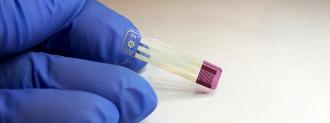Australian researchers have developed a needle-free diabetes test that measures glucose levels from saliva — not blood. It could be ready for consumers as soon as 2023.
The challenge: Our bodies use a hormone called insulin to convert a simple sugar called glucose in our blood into energy. People with diabetes either don’t produce enough insulin or their bodies don’t know how to use the insulin they do produce.
Having chronically high blood-sugar levels can cause health problems, so people treat their diabetes by injecting insulin when levels get high — but to know when that’s happening, they have to test their blood using a painful needle prick multiple times a day.
“To see the biosensor on shelves, changing lives will be immensely satisfying.”
Paul Dastoor
An estimated 30% of people with diabetes experience anxiety over the finger-prick process. That anxiety has been connected to testing avoidance — and if people aren’t testing their blood glucose levels when they should be, they might not be properly managing their disease.
A better diabetes test: Researchers at the University of Newcastle have now developed a pain-free alternative to the finger-prick diabetes test.
It’s a thin sensor about the size of a stick of gum. When a person licks the sensor, a coating on it interacts with their saliva. That reaction creates an electrical current that can be measured to reveal their body’s glucose levels on a smartphone app.
The concentrations of glucose in saliva are much smaller than in blood, so developing a diabetes test that could accurately measure them wasn’t easy, but the sensor is reportedly accurate.
“With this highly sensitive platform, we can now detect glucose at the levels found in saliva, for the first time,” lead researcher Paul Dastoor said in a press release.
Looking ahead: The Newcastle team and its commercial partner, life sciences company GBS Inc., have now secured a USD $4.7 million grant from the Australian Government to manufacture the lickable diabetes test.
They plan to begin construction on a dedicated manufacturing facility before the end of 2021, with the goal of producing devices by 2023.
“To see the biosensor on shelves, changing lives will be immensely satisfying,” Dastoor said. “It’s why we do the work we do.”
We’d love to hear from you! If you have a comment about this article or if you have a tip for a future Freethink story, please email us at [email protected].






